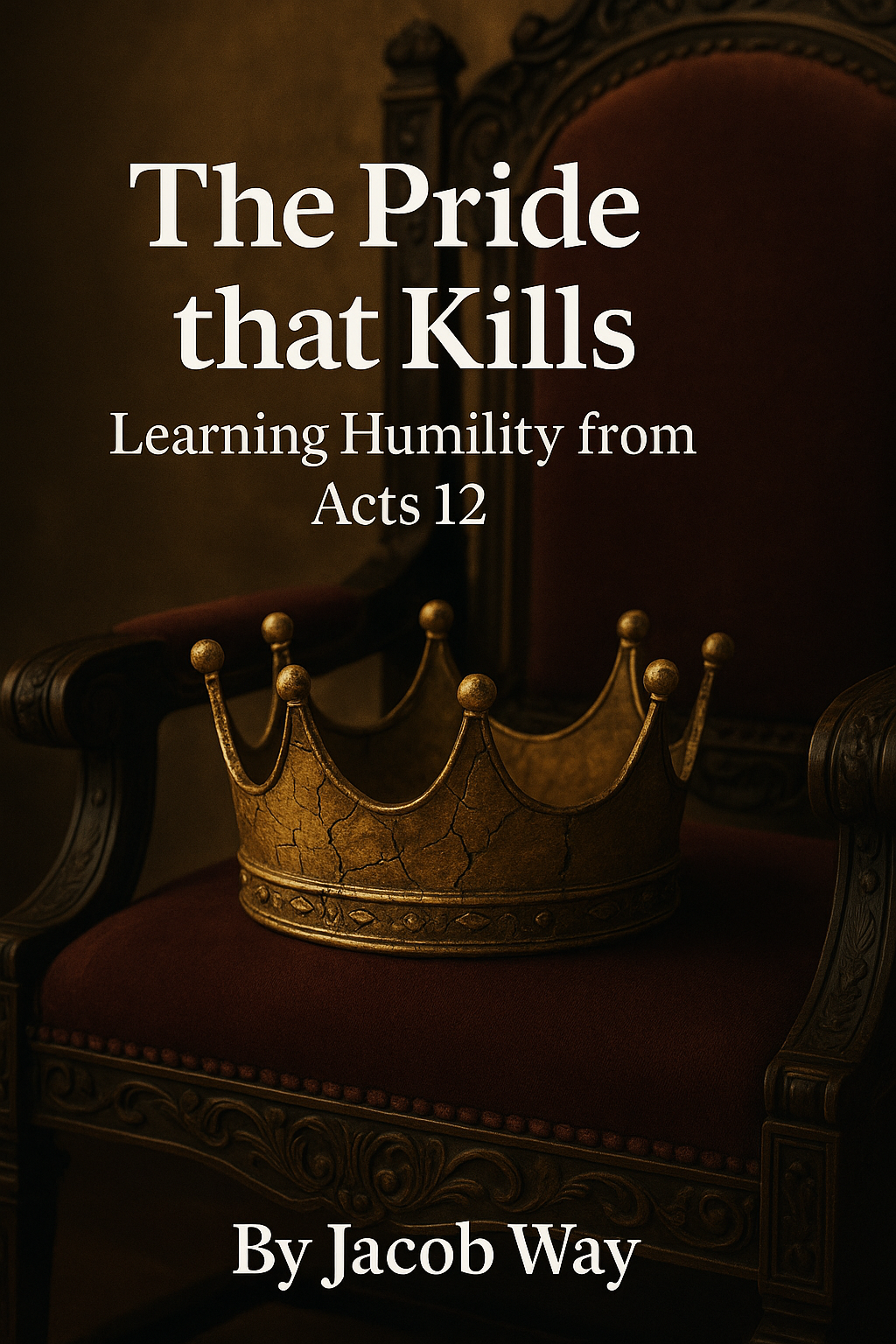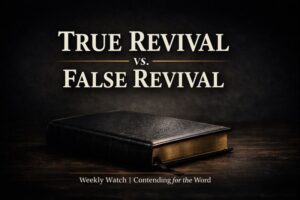⏱️ Estimated Reading Time: 6 min read
The Pride that Kills, Learning Humility from Acts 12
By Jacob Way
In Acts there is a brief story with a profound lesson on God’s righteous justice that is often overlooked.
Herod Agrippa ruled over Judea and Samaria, just as his father and grandfather had before him. Herod was from a line of rulers whose brutality was known in the region and beyond. Brute force and suppression were his favorite tactics for keeping order in the realm. This pattern of repression led to the persecution of the Church and the killing of the apostle James and Peter’s imprisonment, (Acts 12:2–3).
Herod then attended a gathering of people from Tyre and Sidon. These were neighboring towns not in his kingdom, but they relied on the food produced in Judea and Samaria. “Herod had been very angry with the people” from these cities, and there had been strife between them. However, on this day they wanted to meet with the king and “ask for peace,” verse 20, CSB. So “on an appointed day, dressed in royal robes and seated on the throne, Herod delivered a speech to them,” verse 21, CSB. During his speech the crowd deified Herod, shouting, “it is the voice of a god and not of a man,” verse 22, CSB. “At once an angel of the Lord struck him because he did not give the glory to God, and he was eaten by worms and died,” verse 23, CSB. Josephus, the Jewish historian at the time, noted that Herod felt a sudden sharp pain in his heart and abdomen, and died five days later. Some have speculated this was due to intestinal worms. Regardless of the details, Herod was struck down quickly after he failed to give God the glory due to Him.
Pride Kills, Grace Gives Life
What can we learn from Herod. The most significant application is that pride kills, literally. The wages of sin is death, so all sin not covered by the blood of Jesus leads to death and punishment, (Romans 6:23). Pride carries a particular weight, since God is “opposed to the proud,” (James 4:6, NASB). Pride thinks highly of self and lowly of God, it denies who God is and all that He has done, and it is especially dangerous for those who exercise authority.
Nebuchadnezzar, Humbled by God
Nebuchadnezzar was humbled by God after he looked over his kingdom and credited himself rather than God. He lost his mind and lived like a wild animal for seven years. When he came to his senses he confessed, “now I, Nebuchadnezzar, praise, exalt, and glorify the King of the heavens, because all his works are true and his ways are just. He is able to humble those who walk in pride,” (Daniel 4:37 CSB). He learned that his throne was a stewardship from the true King, who gives and who takes away.
Pride in the Life of the Church
The lesson of Herod is not only for kings and rulers, it is also for the people of God gathered in local churches. Pride endangers the health of the body of Christ. When leaders or members seek their own glory, compare themselves with others, or boast in their own wisdom, pride disrupts the unity of the Spirit and dishonors the Lord. Paul calls the church to do “nothing out of selfish ambition or conceit, but in humility consider others as more important than yourselves,” (Philippians 2:3 CSB). A church marked by pride will be filled with division, suspicion, and rivalry, but a church marked by humility will be filled with encouragement, service, and joy.
Humility is not weakness, it is strength under the Lord’s authority. Peter exhorts believers, “all of you clothe yourselves with humility toward one another, because God resists the proud but gives grace to the humble,” (1 Peter 5:5 CSB). Humility in the life of the church means we honor the gifts of others, submit to godly leadership, and serve one another in love. In this way the people of God display the beauty of Christ, who “did not come to be served, but to serve, and to give his life as a ransom for many,” (Mark 10:45 CSB).
When pride dies and humility lives in the local church, the world sees a living testimony to the gospel. Not competing kingdoms where each person seeks recognition, rather a community where Christ is exalted and His grace is displayed. This is God’s design for His people, that together they would reflect His glory not by lifting themselves high, but by bowing low before Him and lifting one another up in love.
Humility in Everyday Life
We should have the same humility that Nebuchadnezzar had when he came to his senses. Although none of us rule a kingdom, we still exercise authority in measure. In work, in family, and in community, we are called to demonstrate the reality of the gospel by how we live. We steward all that God gives, including influence, for the fame of His name and not our own.
As we mature it is easy to look around at our “kingdom” and praise ourselves for where we are. After a strong lesson, a teacher may think, my rapport carried the day, after a peaceful day in a busy home, a parent may think, my skill made this happen. These are the very moments where we must learn from Herod and Nebuchadnezzar, we must humble ourselves before the Lord.
Grace for the Humble
First, we take these sins to God and ask for forgiveness and cleansing. Christ went to the cross with joy to forgive pride and every sin. He died to save us from the punishment our pride deserves. Once forgiven, we keep our eyes on God. See Him as He is, compare yourself to Him, humble yourself. Recognize that all you have, and all that you are, comes from His kindness toward you. He loves you and He cherishes you. We cling to His promise, “He is opposed to the proud, He gives grace to the humble,” (James 4:6 NASB). Put simply, God is against the proud, and He is for the humble. He gives grace upon grace to those who acknowledge their need, and He uses them for His kingdom. What a privilege.
Next time you feel the pull of pride in achievement or in praise, say, not I, but Christ who lives in me, Galatians 2:20 CSB.
For Reflection and Discussion
- Where has pride quietly taken root in your service, your home, or your work?
- What would it look like to practice Philippians 2:3 in your church this week?
- Who can you encourage and honor, so that Christ receives the glory?
For more from our series visit: God’s Design for the Local Church and the Life of the Believer Archives – Servants of Grace
Jacob is a committed husband, father, and teacher. He has taught social studies for over a decade in the US and internationally. He has written Right Before the Bell: A Teacher’s Weekly Devotional to help teachers use God’s Word to shape their classrooms. He is also the author of Hope to Win the War: How Pornography Enslaves and the Truth Frees. He loves reading, watching movies, hiking, and eating great food. Jacob also has the privilege of serving as an elder in his local church, and one of his greatest desires is to see people become all that God made them to be. He lives and teaches overseas with his wife and two children.




